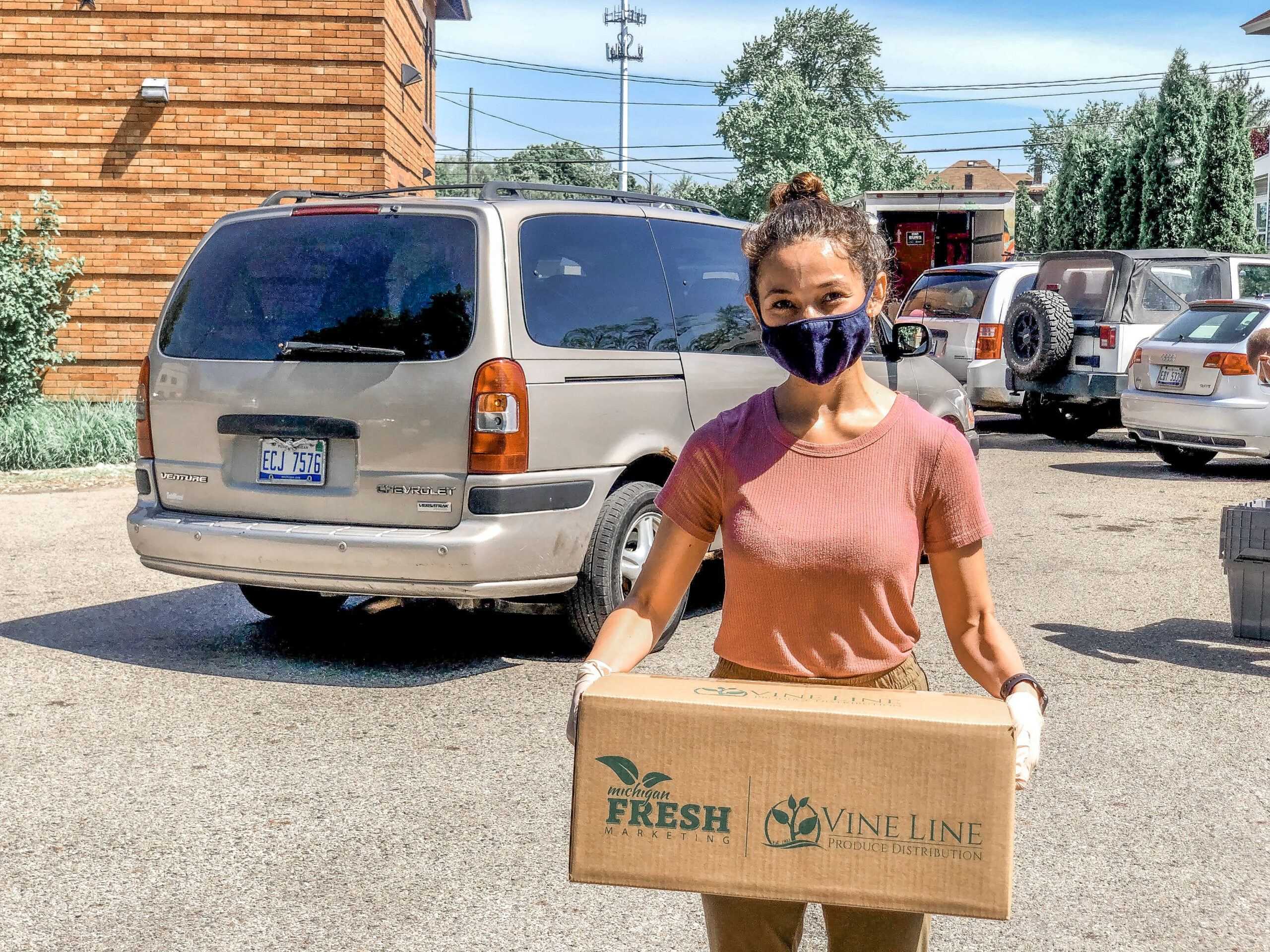Though both companies have been part of the Michigan apple scene for more than 60 years, Michigan Fresh and BelleHarvest formed a sales alliance in 2019 to increase their scope and ability to meet customer demand. Though the day-to-day operations at their various packing facilities have not changed significantly with the sales alliance, combining forces prepared both organizations to meet consumer needs faster and with more operational resilience when the unexpected happens—like COVID-19.
Angela Sommers, the Marketing Director for the sales alliance, shared with USApple how the number one priority over the course of the pandemic has been to keep workers safe—especially those who are not able to do their work from home.
Michigan Fresh Marketing and BelleHarvest implemented new rules to ensure compliance with federal and state guidelines, including wearing face masks inside any facilities, public spaces or offices. Masks were provided to all employees. No visitors have been allowed inside, and every employee’s temperature is checked each day when they arrive to work. Even after the pandemic, Sommers expects the new digital thermometer will still be useful during flu season.
Team members also use QR codes to scan and complete digital surveys that ask whether they are experiencing any symptoms or have come in contact with anyone who has the virus. Packing facilities have also been equipped with additional handwashing stations, supplies, and more space for lunch and breaks. Employees are encouraged to eat outside.
“On our packing lines, it’s challenging to maintain six feet, but we’re doing our best to keep people dispersed throughout washing, waxing and packing roles,” said Sommers.
Though preparation and preventive measures have been thorough, responding to positive tests with clear information and guidance for employees has been equally critical.
“We’ve had employees test positive,” said Sommers. “We chose to have everyone tested to prevent a spread and keep employees safe. The individuals that were positive stayed home and were tested again before returning to work,” explains Sommers. With a proactive and quick response, the facilities were able to prevent further spread.
For team members in the marketing and sales departments who have transitioned to working from home, many are accustomed to traveling and meeting with contacts in person. Relationship building is a crucial part of their jobs and transitioning to a virtual setting has been an adjustment.
“It’s not entirely business as usual. How do you express authenticity without a handshake?”
Angela expects virtual business will be here to stay in some capacity, even after the pandemic. Being able to communicate the value of her programs for the upcoming year in a virtual setting has been an area of focus for her. While predicting what will happen next is a challenge for every business right now, Michigan Fresh Marketing and BelleHarvest know that emphasis on food safety and sustainable packaging will remain relevant.
“We are anticipating that the strong demand for packaged apples will continue through the end of the year and likely further,” explains Sommers. “Consumer buying patterns have changed, and many trend towards packaged produce. Our company has been working towards a new 100% recyclable and sustainable three-pound apple carton and look forward to launching this item in the fall, as it provides protection of the fruit but also the environment.”
Michigan Fresh Marketing has found ways to pivot their business model and operations to meet the moment. Because they operate year-round with other types of produce, including vegetables, the organization was able to successfully bid on a USDA Food Box program. Usually, when the apple packing season ends in late spring or early summer, the size of the team is scaled back.
“With the farmers to families food box program, we were able to keep several existing employees and add about 100 new employees,” said Sommers. “In a short timeframe we switched from packing apples to produce boxes. Our team had to swiftly ramp up safety practices with all the new employees joining the team.”
As restaurants closed or reduced their operations, the demand for businesses like Michigan Fresh Marketing and BelleHarvest changed. The USDA Food Box program ensured that their team remained employed, that produce was not going to waste, and that families who needed extra food could find it locally.
“We had to be able to change our business model overnight to pack these boxes. Apples are just one part of it,” shared Sommers. “We’ve set up a whole new assembly line and are now doing twelve truckloads a day to serve families in Michigan, Indiana and parts of Illinois.”
Boxes are distributed at churches, nonprofits, food banks and other community centers and pop-up pantries. Cars line up, and volunteers load boxes into trunks so that person-to-person contact is minimal. One hundred and twenty nonprofits have been served so far.
“We are considered essential,” said Sommers, “but to truly be able to work through these challenging times and know you’re feeding people is motivating in itself. Seeing what the team has done with this program is why I want to work in produce.”








